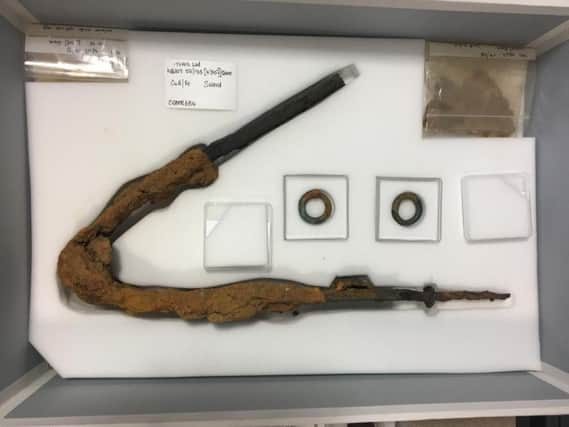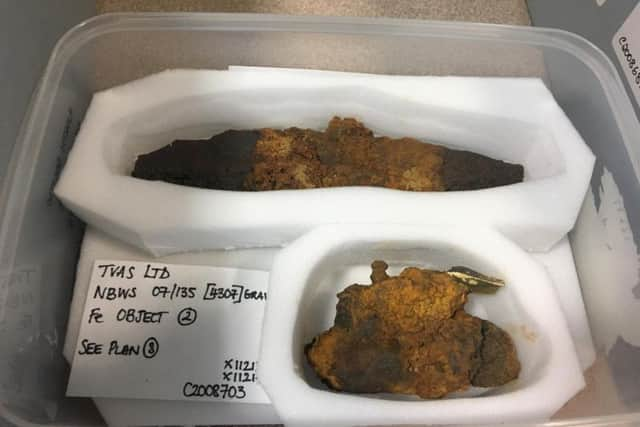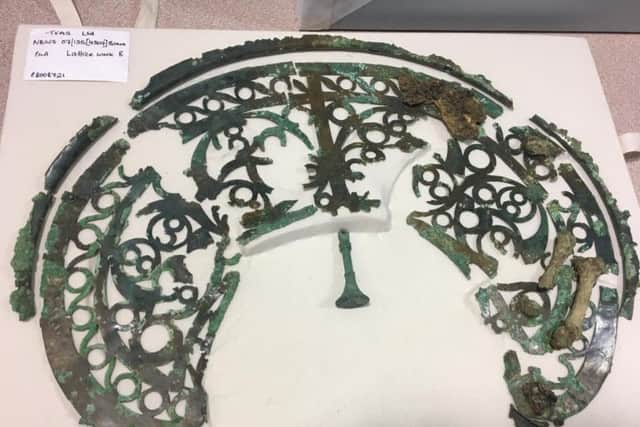2,000-year-old skeleton of 'legendary' warrior to go on show in Chichester


The mysterious warrior, who may have fought alongside King Commius during Julius Caesar's wars with the Gauls, was discovered 12 years ago in Berkeley Homes' Bersted Park development, in the most elaborately equipped warrior grave ever found in England.
Dated to about 50 BC, the late Iron Age warrior was ceremoniously buried with pots at his head, an extravagant helmet, his shield, and a sword and spear which were broken as a 'decommissioning' of the items or to be killed with their master, is it believed.
Advertisement
Hide AdAdvertisement
Hide AdDue to its significance, a team of world class experts have been working with the Novium Museum, where it will be exhibited, to analyse and interpret the finds to tell the story of this incredible individual.
The extraordinary exhibition will begin on January 25 2020 and will be the first time the warrior and his possessions will be on public display. It will explore the life, health and death of the fascinating man and will attempt to explain some of the questions that have been raised by the circumstances of his burial.
Archaeologist for Chichester District Council, James Kenny, was one of the first people to lay eyes on the internationally significant find.
He said: "In more than 30 years of archaeology this is the most spectacular discovery that I have witnessed. Thanks to scientific research, analysis and the involvement of world-renowned archaeological experts, the story of the mystery warrior just gets better.
Advertisement
Hide AdAdvertisement
Hide Ad"Due to the richness of the finds within the grave, we believe that the mystery warrior held one of the most prestigious roles in the country. This is one of the most exceptional finds in this particular archaeological period and it is of international significance."


Analysis of the man shows he had a disproportionately large arm, which he will have used for his sword or spear, strong legs from spending a lot of time riding a horse, and signs of osteoarthritis in his neck, which wouldn't have been helped by the massive helmet.
He was about 5"4' in height and was roughly 45 when he died.
Dr Melanie Giles senior lecturer in archaeology at The University of Manchester said it was apparent the man had a 'hard-life' but there was no sign of a traumatic injury that may have killed him.
Advertisement
Hide AdAdvertisement
Hide AdMr Kenny added: "What distinguishes this discovery from any other burial in Britain is the breath-taking quality and beauty of the artefacts and the range of his possessions. The warrior had a full suite of weapons, including a stunning sword in a decorated scabbard, a spear and a shield with a large bronze boss.


"One of the most spectacular finds within the burial is the headdress for the helmet. This is decorated with an exquisitely designed bronze openwork crest — a completely unique discovery."
Cllr Roy Briscoe, cabinet member for community services and culture at CDC said: "Thanks to the National Lottery Heritage Fund, Berkeley Homes and Irwin Mitchell, we are able to tell this fascinating story.
"The mystery warrior was a resistance figure who bought with him the story of war, and strategic military knowledge of how to fight the Roman army. This is a story that has yet to be told and one which is of great importance locally, nationally and internationally.
"This exhibition will help museum visitors to explore how locals mourned this legendary military figure."